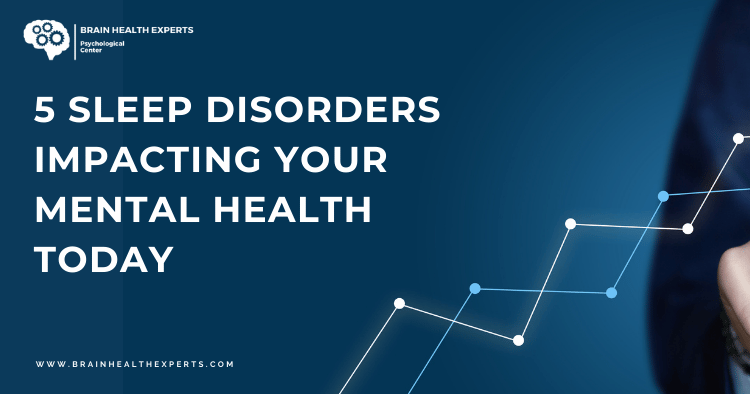Introduction
Sleep is a fundamental pillar of our health, yet millions of people around the world suffer from sleep disorders that can profoundly affect their mental well-being. Sleep disorders not only disrupt our nightly rest but can also exacerbate or trigger mental health issues like anxiety, depression, and stress. In this article, we’ll explore five common sleep disorders and how they impact mental health. Let’s dive in!
1. Insomnia
Insomnia is one of the most prevalent sleep disorders, characterized by difficulty falling asleep, staying asleep, or waking up too early. According to the American Psychological Association, about 30% of adults report symptoms of insomnia, and about 10% suffer from chronic insomnia.
Chronic insomnia can lead to a range of mental health issues, including increased anxiety and cognitive impairment.
Impact on Mental Health
Chronic insomnia can lead to a range of mental health issues, including:
- Increased Anxiety: Lack of sleep can heighten feelings of anxiety, making it difficult to manage stressors. For techniques to reduce anxiety, consider exploring 10 effective techniques to manage anxiety in daily life.
- Depression: Research shows a bidirectional relationship between insomnia and depression; not only can insomnia contribute to depression, but it can also make recovery from depression more challenging. For more insights, check out 10 key insights to deepen your understanding of depression.
- Cognitive Impairment: Insufficient sleep negatively affects attention, decision-making, and memory, leading to decreased productivity and increased frustration.
Tips for Managing Insomnia
- Stick to a Sleep Schedule: Go to bed and wake up at the same time every day.
- Create a Sleep-Friendly Environment: Keep your bedroom dark, quiet, and cool.
- Limit Screen Time: Reduce exposure to screens before bedtime to help your body wind down. For more tips on boosting mental health, see 10 daily habits to boost your positive mindset.
2. Sleep Apnea
Sleep apnea is a serious disorder where breathing repeatedly stops and starts during sleep. Approximately 30 million Americans suffer from this condition, with many being undiagnosed, according to the National Heart, Lung, and Blood Institute.
The effects of sleep apnea extend beyond physical health, leading to significant mental health challenges.
Impact on Mental Health
The effects of sleep apnea extend beyond physical health, leading to:
- Daytime Fatigue: Frequent awakenings during the night can lead to chronic fatigue, affecting your mood and overall mental clarity.
- Mood Disorders: People with sleep apnea are at a higher risk of developing mood disorders such as anxiety and depression. For more insights on how to manage anxiety, see top 10 anxiety management apps to boost well-being.
- Cognitive Decline: Chronic sleep deprivation from sleep apnea can lead to issues with memory and attention.
Tips for Managing Sleep Apnea
- Consult a Healthcare Professional: Seek a diagnosis and treatment options, which may include CPAP therapy or lifestyle changes.
- Maintain a Healthy Weight: Weight loss can significantly reduce the severity of sleep apnea symptoms.
- Avoid Alcohol and Sedatives: These can relax the throat muscles and worsen sleep apnea.
3. Restless Legs Syndrome (RLS)
Restless Legs Syndrome is a condition characterized by an uncontrollable urge to move the legs, usually due to uncomfortable sensations. RLS affects up to 10% of the population, according to the National Institute of Neurological Disorders and Stroke.
The constant discomfort associated with RLS can lead to significant emotional distress and sleep disruption.
Impact on Mental Health
The constant discomfort associated with RLS can lead to:
- Sleep Disruption: People with RLS often experience interrupted sleep, which can exacerbate feelings of irritability and anxiety. For stress reduction techniques, consider 10 proven stress management techniques for daily relief.
- Emotional Distress: The frustration of dealing with RLS can lead to increased stress and depression over time.
- Social Withdrawal: Individuals may avoid social situations due to fatigue or embarrassment from their symptoms.
Tips for Managing RLS
- Establish a Bedtime Routine: Engage in relaxing activities before bed, such as reading or taking a warm bath.
- Avoid Stimulants: Reduce consumption of caffeine and nicotine, especially in the evening.
- Consider Supplements: Some individuals find relief with iron supplements, but consult a healthcare provider first.
4. Narcolepsy
Narcolepsy is a neurological disorder that affects the brain’s ability to regulate sleep-wake cycles. It is estimated that 1 in 2,000 people in the U.S. has narcolepsy, yet many remain undiagnosed, according to the Narcolepsy Network.
Narcolepsy can lead to significant mood fluctuations and social isolation, impacting overall mental health.
Impact on Mental Health
Narcolepsy can significantly affect mental health, leading to:
- Mood Fluctuations: The unpredictability of narcolepsy can lead to feelings of anxiety and frustration.
- Social Isolation: Individuals may withdraw from social activities due to fear of sudden sleep attacks.
- Cognitive Challenges: People with narcolepsy may experience memory problems and difficulty concentrating, which can contribute to feelings of inadequacy.
Tips for Managing Narcolepsy
- Regular Sleep Schedule: Maintain a consistent sleep-wake cycle to help regulate symptoms.
- Scheduled Naps: Short naps during the day can help manage excessive daytime sleepiness.
- Medications: Talk to your doctor about stimulant medications that can help control symptoms.
5. Circadian Rhythm Disorders
Circadian rhythm disorders occur when the body’s internal clock is misaligned with the external environment. This can lead to irregular sleep patterns and is often seen in shift workers or those with irregular schedules. The American Academy of Sleep Medicine details these disorders and their implications.
Disruptions in circadian rhythms can lead to long-term mental health risks, including anxiety disorders and depression.
Impact on Mental Health
Disruptions in circadian rhythms can lead to:
- Sleep Quality Issues: Poor sleep quality can result in feelings of tiredness and irritability. For tips on boosting emotional well-being, see 10 effective strategies for building resilience in mental health.
- Increased Stress: Irregular sleep patterns can elevate cortisol levels, contributing to stress and anxiety.
- Long-term Mental Health Risks: Prolonged circadian misalignment is linked to a higher risk of anxiety disorders and depression.
Tips for Managing Circadian Rhythm Disorders
- Light Exposure: Get natural light exposure during the day and reduce light exposure at night to help regulate your internal clock.
- Consistent Schedule: Try to maintain a regular sleep schedule, even on weekends.
- Create a Relaxing Environment: Develop a calming pre-sleep routine that signals to your body that it’s time to rest.
Conclusion
Sleep disorders can significantly impact mental health, creating a cycle of poor sleep and psychological distress. Understanding these disorders and implementing effective management strategies can lead to improved sleep quality and enhanced mental well-being. If you are struggling with sleep issues or mental health concerns, consider consulting a healthcare professional for guidance and support.
FAQs
1. Can sleep disorders cause mental health problems?
Yes, sleep disorders can contribute to or exacerbate mental health issues such as anxiety and depression.
2. How can I improve my sleep quality?
Establish a consistent sleep routine, create a relaxing sleep environment, and limit exposure to screens before bedtime.
3. Should I consult a doctor for sleep issues?
If you are experiencing persistent sleep problems, it is advisable to consult a healthcare professional for evaluation and treatment options.
4. Are sleep disorders common?
Yes, many sleep disorders are common and often go undiagnosed, affecting millions of individuals worldwide.





